Thursday, April 6th 2017
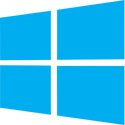
Windows 10 Creators Update to Feature New Levels of Privacy Control
Developing on the latest Creator's Update release version of Windows 10 being available from Microsoft's Update Tool, there is a feature that needs further addressing: the new privacy settings. Microsoft is well aware (as well it should be, given the public outcry at its telemetry features) that Windows users were not happy with the fact that the company seemed to be trading their privacy for increased information - and ad revenues - in their new "Windows as a service" approach. Even though some of this telemetry and usage reports are essential towards achieving a good user experience in later updates, the general opinion was that Microsoft collected too much, with too little information being shared with users about what, when, and why. Now, Microsoft is looking to clean up its act without the obfuscation of hiding privacy setting in endless sub-menus.
There are now three levels of diagnostic information collecting being done at the OS level: Basic, Enhanced, and Full. Notice the absence of an "off" mode, which is something Microsoft likely will never budge on this new "Windows as a service" approach. However, the Basic mode now collects almost half of all the information that was previously collected. Users installing new versions of Windows will see a screen upon the configuration stage where they will be able to toggle privacy settings with a more refined filter than before, and your privacy settings will now (finally) carry over between major Windows updates, which means they won't reset without your knowledge. The same will happen with users that simply upgrade their Windows version with the new Creators Update.
Sources:
Windows Blogs, Tom's Hardware
There are now three levels of diagnostic information collecting being done at the OS level: Basic, Enhanced, and Full. Notice the absence of an "off" mode, which is something Microsoft likely will never budge on this new "Windows as a service" approach. However, the Basic mode now collects almost half of all the information that was previously collected. Users installing new versions of Windows will see a screen upon the configuration stage where they will be able to toggle privacy settings with a more refined filter than before, and your privacy settings will now (finally) carry over between major Windows updates, which means they won't reset without your knowledge. The same will happen with users that simply upgrade their Windows version with the new Creators Update.
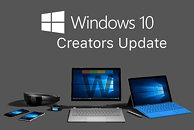
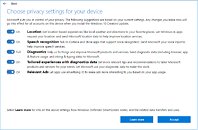
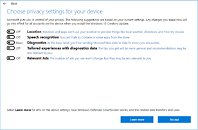
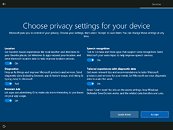
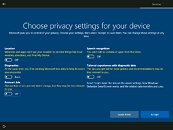
42 Comments on Windows 10 Creators Update to Feature New Levels of Privacy Control
edit: in looking at the free version specs, it looks like it doesn't allow changes for any "core" operations, ie anything in \windows\* directory. Still, I'll give it a try, see if it's worth it to purchase an upgrade...
I ask because I experience random video "blackouts" but I think it's an nvidia driver issue.
Here's two very much better firewalls.
www.privacyware.com/personal_firewall.html
personalfirewall.comodo.com/
I actively use both, Privatefirewall 7 for machines I personally use and Comodo's Personal firewall[use the free version and ignore/decline the premium stuff] for the family PC. Both are free and do a MUCH better job than the windows firewall can, all-be-it at a learning curve.
Oh, I forgot... Google is good, Microsoft is bad. Must have missed that meeting.
The same reason why I still have Windows boxes in the house.
In future, if you're going to make statements which serve only to make you look like a fool, do try and lace it with less fanboyism.
I just received iOS 10.3.3 today on my iPhone 7 Plus on AT&T while at the same time my brother who is on Verizon will be receiving the same version of iOS.There are many components that make up Android, the open source components (the Linux-based sub-systems) and the closed source components such as the Google Play Services that make up such things like Maps, Gmail, The Play Store, etc. How do we know exactly what all of that stuff is doing? We can't because the source isn't available and Google, like Microsoft, isn't going to just let anyone look at the source code. That's their crown jewels, the secret sauce, etc. People who use Android devices should understand that Google is hoovering up your data and there's nothing you can do about it.
And then there's the tired argument that people bring up saying that they have more personal data on their desktops than their phones. Wrong. You have more personal data on your phones than your computer simply because you carry the thing in your pocket everywhere you go. It's collecting God knows how much data based upon where go (restaurants you eat at, stores you shop at, etc.), what web sites you visit, what videos you watch, the people in your contact list/address book, email, etc. All of that is being collected by Google to form a virtual form of you just so they can show you ads on various Google services. Hell, even YouTube does the collection of the data. I've been watching a lot of tech-related videos lately and guess what? YouTube is showing me even more tech-related videos from known popular tech-related YouTube channels.
About the only big company that comes within a mile of caring about your privacy is Apple but until Apple decides to let users use MacOS on generic PC hardware (which I highly doubt will ever happen) which operating system can we use? We're all pretty much forced to use Windows (that is, if you want any major software support) and I don't see that changing at all in the next coming years. I know, people are going to trot out the Linux argument about how because it's free and open it'll blah blah blah. We've been saying "This year will be the year of the Linux desktop" for years and yet it never lives up to it. The closest thing that Linux has come to as far as being a mainstream OS is Android but that's only because it's got a user friendly user interface layered on top of it. Most people wouldn't even know Linux was there. Then you have web servers which more than likely TechPowerUp is powered by a Linux-based server using the good old LAMP stack which consists of Linux (duh!), Apache, MySQL, and PHP. If you're getting the sense that Linux is more of a behind-the-scenes OS, you'd be right.
So it comes down to the simple question... Other than Windows, what alternatives do we have? We're pretty much shit out of luck in this regard.
Android really isn't a desktop OS, it was never designed to be one. About the only OS that has come from Google that can be a real contender on the desktop front is ChromeOS and that's only because recently people can use traditional Android apps in a window on ChromeOS which makes it feel more like a desktop OS. As for iOS, it's come a long way with the introduction of iOS 11 but I still feel that it's just not quite up to the usability and productivity standards of a traditional desktop OS. I can't blame Apple here, morphing iOS on the iPad into having a more desktop-feel would eat into their MacOS platform and they don't to do want that (at least not yet). Do I see iOS eventually being the standard OS in the Apple world? Eventually but not any time soon.
Part of this stems from the fact that Linux isn't modular, the kernel itself is one giant monolithic kernel with everything that it needs to run as part of the core code. Drivers are even part of the core code which doesn't make it very transportable from one type of platform to another. There's really no way to plug in a driver into the Linux kernel like one can on Windows and MacOS due to Linux not having which is commonly referred to as an ABI or Application Binary Interface. On Windows you can load DLL and SYS files into the system and the kernel loads them into kernel space to drive the hardware. MacOS has almost the same concept with KEXTs. Linux has no such implementation.
This is the reason why Android is stuck on "long term" versions of the Linux kernel. Nougat is finally getting Linux kernel version 4.4.1 which is what people refer to as LTS or "Long Term Support". Meanwhile if you look at Kernel.org you'll find that the latest stable Linux kernel release version is 4.12.2. The reason this is so is because getting things to play nice with the Linux kernel isn't at all very easy. Qualcomm drivers for instance are for the most part binary-only packages, they have been built against Linux kernel version 4.4.1 and if you attempt to try and load them into anything newer than that it tends to fall apart because, you guessed it, there's no ABI or standard API to be able to plug into the Linux kernel.